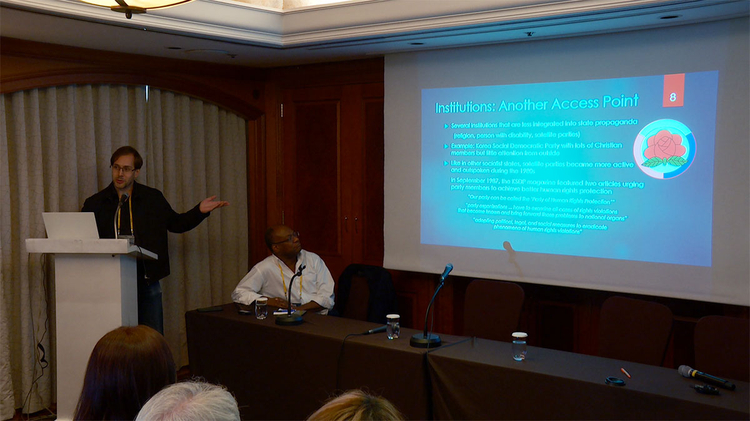
Verify Your Sources: Delivering DPRK Issues
2018년 10월 07일 15시 30분
[This article was written by student reporters of IJAsia18.]
On Oct. 7, 2018, the last day of Uncovering Asia 2018, three Korean investigative reporters gathered at the session Investigative Journalism & South Korea to talk about the future of investigative journalism in Korea and what aspects need to be enhanced.
Yongjin Kim, Editor-in-chief of KCIJ-Newstapa, as a moderator said it is important for Korean media to collaborate and work hard to achieve a mutual goal. He emphasized that the aim of the IJAsia18 conference as well as the session is to enable Korean journalists to interactively discuss the things that matter, and hopefully contribute to prosperity of investigative journalism.
“I have been doing journalism for over 30 years, but it seems like this conference is first of its kind to have lots of Korean journalists and let them think about the future of Korean journalism,” Kim said. “Through IJAsia18, I hope Korean journalists could find a way to enhance the quality of work through sharing insights and working together. I think that is something we need to strive for the better.”
The session kicked off with the speech by Yong-seok Son, Chief Investigative Correspondent at JTBC, who first reported about a tablet PC that belonged to Choi Soon-sil, the presence of a close confidante of ex-President Park Geun-hye. The JTBC investigation on Choi’s tablet PC exposed crucial evidences that she had a great influence in key decisions made by the Park administration. The series of investigation eventually resulted in thousands of people come out to the streets calling for her impeachment.
Son’s presentation “Metadata in a Tablet PC change” shared his experience of how he investigated metadata by exemplifying one of his works, which exposed how Choi -- a civilian -- was deeply involved in Park’s Dresden Speech in 2014.
His team found more than 200 documents, including 40 speech drafts and Park’s private holiday photos, inside Choi’s device.
”Words cannot describe how much information we could learn from Metadata,” Son said, adding that the Metadata helped providing key traces of Choi.
The Metadata provided crucial information such as size of the file, time and place the photo was taken, which camera was used(front/back), who the user was, and which program the user used.
He added that “the coverage offered an opportunity to gravitate and gave a further encouragement to investigative journalism in Korea.”
Inbo Sim, the KCIJ-Newstapa reporter who first broke the incident of Samsung Chairman Lee Kun-hee’s suspected prostitution, stressed that Korean journalism needs to monitor more closely on Chaebol -- a Korean word that refers to a large family-owned conglomerates. He furthered his speech with the two stories he investigated.
Links to Sim’s stories:
-Hanwha Group Chairman Kim Seung-youn’s "Prison Break"(Link)
-Samsung Falsely Accuses its Ex-Executive for Technology Leak to China(Link)
Sim called for the need of Korean media monitor the conglomerates more closely, since it has so strong influences that it even destroys Korean democracy. He explained that text messages exchanged between Samsung’s key executive Choong-gi Jang and high-level government officials and political figures show that how Chaebol have taken control of lawmakers and the government’s major administrative decisions.
“The reckless power of Chaebol in Korea is like poison gas,” Sim said. “Once it leaks, it intoxicates people without them noticing. There lies a reason why we as journalists should monitor them.”
Late President Roh Moo-hyun said, ‘The power seems to have shifted to the market. The power that drives our society comes from the market.’ Even though his words are from 13 years ago, it still works like a prophecy.
Jin-koo Kang, a labor reporter-turned-certified labor attorney at Kyunghyang Shinmun, explained that he decided to obtain the license himself because Korean news outlets barely dedicated a corner for labor issues while remaining business-friendly.
He stressed that Korean journalism needs to offer more diverse opinions on labor issues, explaining that 10 news outlets criticized or opposed this year’s minimum wage hike, while only three supported or remained neutral, referring to a study.
On a question on a journalist playing a role of stakeholder -- as a labor attorney -- Kang said: “I can stand the criticism appraising negatively on me being work as Certified Labor Attorney, which is not a traditional role of journalist. But my personal philosophy is to use every possible means that I have in pursuing justice.”
report: Chaeun Moon, Seoyeon You
뉴스타파는 권력과 자본의 간섭을 받지 않고 진실만을 보도하기 위해, 광고나 협찬 없이 오직 후원회원들의 회비로만 제작됩니다. 월 1만원 후원으로 더 나은 세상을 만들어주세요.